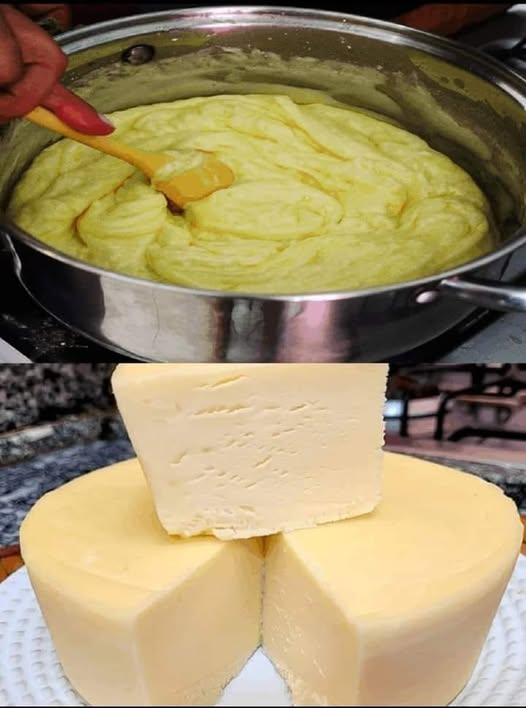ADVERTISEMENT
The milk will begin to split into curds and whey when you notice the formation of curds. Increase the amount of vinegar or lemon juice if curds do not begin to develop.
3. Mix Well and Set Aside
Stir the mixture gently after adding the acid. To ensure complete coagulation, cover the pot and let it undisturbed for about 10-15 minutes.
Next, separate the curds.
Spread a small layer of clean kitchen towel or cheesecloth into a colander. Set up a big dish below the colander to collect the whey.
Make Your Own Cheese at Home Let the whey drain out as you gently dump the curds and whey into the colander. After 10–15 minutes, or until the cheese is the consistency you like, set it aside to drain.
Move the curds to a mixing dish when they have drained. At this point, you may add the unsalted butter and stir it into the curds well if you want a creamier cheese.
Stir in salt until fully combined. At this point, you may also add any spices or herbs you like to make flavored cheese.
Next, form and set the cheese.
Press the cheese gently into a block or a sphere after transferring it to a clean piece of cheesecloth. After encasing it in the cloth, lay it on a dish and use a weight to extract as much whey as possible. Place in the fridge and let for at least four to six hours, or all night.
Serve after slicing
When the cheese has cooled, remove it from its packaging and cut it into pieces or whatever shape you choose. You may eat it on its own, toss it in a salad, or add it to your favorite recipes.
Methods for Crafting the Finest Cheddar at Home
Using New Milk: How the cheese tastes and feels is heavily dependent on the milk’s quality. Using fresh, whole milk from a dependable source will provide the greatest results.
Spice It Up: Put Your Spin on Cheese by Sprinkling In Herbs Like Basil, Thyme, Or Rosemary. For more flavor, try adding garlic powder, chili flakes, or cracked pepper.
Put the Whey to Good Use: The remaining whey has many nutritional uses, including in baking, smoothies, and even as a soup or sauce foundation.
Try Curdling the Milk with distinct Acids: Yogurt, lemon juice, or vinegar all impart slightly distinct flavors.
Distinct varieties
For a savory twist, try making herb cheese by mixing dried herbs like oregano, thyme, and parsley with the cheese.
Additional Recipes: Peanut Butter Haystacks That Don’t Require Baking
Cheddar with Garlic and Pepper: For a spicier taste, add minced garlic and cracked black pepper.
For a spicier twist, try chili cheese with chopped fresh chile or chili flakes.
Details on Calories From a Single Serving (in 1 ounce)
Keep in mind that the actual amount may vary depending on the serving size; this is just a rough estimate.
Energy: about 80
One gram of carbohydrates [g]
Five grams of protein
Seven grams of fat
Eighty milligrams of sodium
Capacities: 10% RDA
Time Spent Preparing
10-Minute Prep Time
Prep Time: Half an hour
How Long to Set: 4 to 6 hours (or all night)
Duration: 5 to 7 hours
Holiday Joy: Simple A Recipe for Christmas Cherry Bars
An Indulgent Treat: Making Caramel Candy at Home
Tips for Preserving Homemade Cheddar
You may keep homemade for up to a week in the fridge if you seal it well. To add moisture and prolong the cheese’s shelf life, place it in a saltwater brine if it’s somewhat dry.
Incorporating Homemade Cheddar into Dishes
There are several recipes that call for this handmade cheese. Consider these suggestions:
For a protein boost and extra taste in your crumble it over some fresh greens.
Melt it and use it as a filler in grilled sandwiches for a creamy and tasty treat.
Pasta Recipes: For a velvety texture, try adding it to risottos, casseroles, or pasta.
Pizza Topping: Easy Way to Make Your Own Cheese Add it on pizza or flatbread for a delicious topping
